Environment Justice Matters Vol. 4 Issue 01
Vol 4. Issue 01
Featured
ESG’s 25th Year
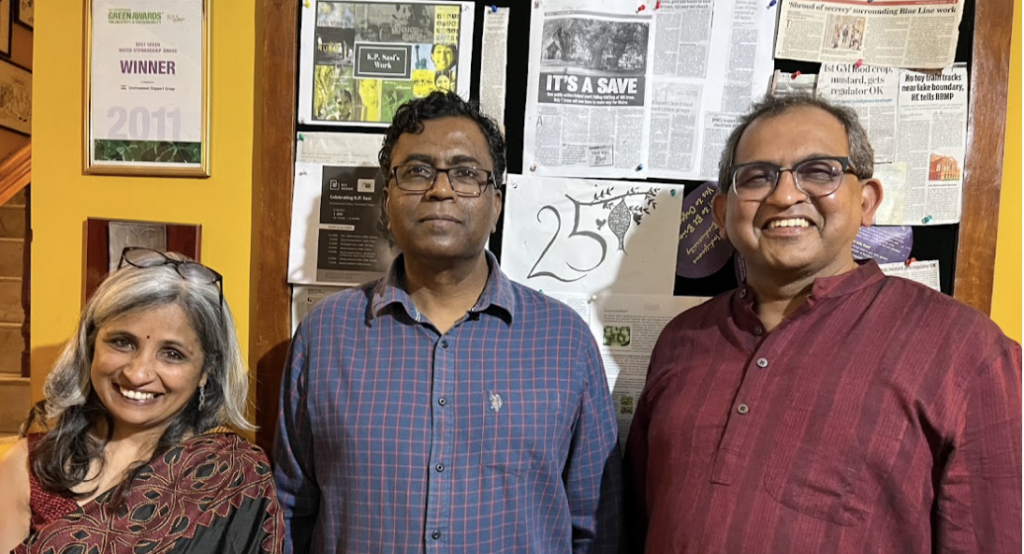
Indian Express focuses on ESG in its 25th year. The article traces how ESG was formed in response to massive struggles underway in the 1990s questioning the modes of extractive development given their irreversible and adverse socio-economic and environmental impacts, particularly in the ecologically sensitive Dakshina Kannada region. The article focuses on how ESG has been working with a range of marginalised and vulnerable groups across India ever since, and has been in the forefront of struggles to secure voiceless ecosystems from ruin.
Upcoming Workshop
Reclaim and Turn Inclusive Bengaluru and its Blue-Green Commons
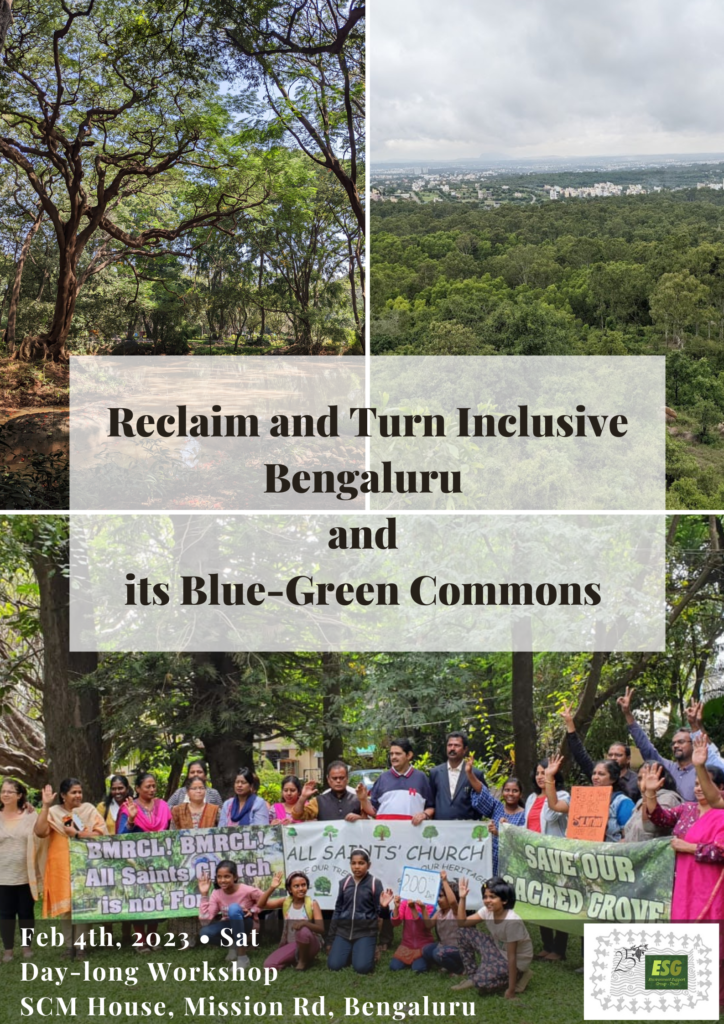
We welcome you to participate in a day-long workshop to introspect how Bengaluru can be turned into a healthy, sylvan, inclusive and accessible metropolis. More details soon. Please register to participate.
Attack on Urban Greenery inside and outside of Bengaluru
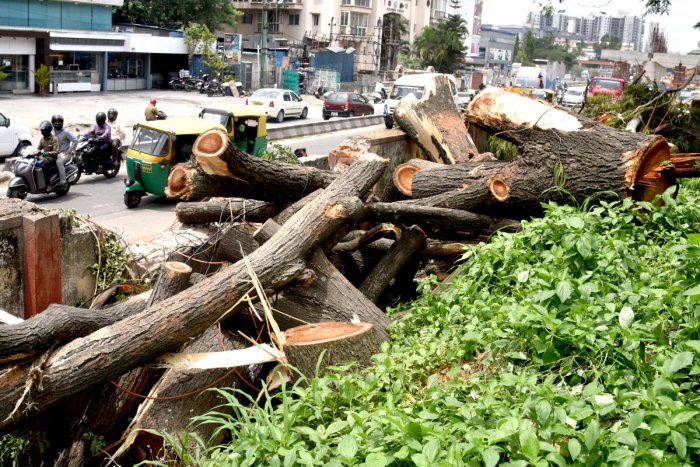
Recently, over 50 well grown trees were cut down overnight on Ballari road – from Cauvery Theatre to Mekhri Circle – for road widening. This follows a pattern that was initiated in the mid 2000s when civic authorities claimed almost 400 roads needed to be widened across Bengaluru to accommodate evergrowing vehicular numbers. ESG worked with Hasiru Usiru and other community networks across the city to highlight how such schemes were flawed in their conception, promoted an unsustainable model of urbanisation, and would render the metropolis into a soulless, smogulous, inhumane mass of concrete and chaos. This forced a change in approach. Later efforts by Citizens for Bengaluru resulted in the axing of the steel flyover project. But the road widening phantom appears to have surfaced with a vengeance now!
Now dozens of old trees in Sadashivnagar and various public spaces are threatened by a 4-lane flyover from Bhashyam Circle to Malleshwaram 18th Cross. This has drawn widespread criticism, especially from local communities, who argue that this will only shift the congestion to another point – not solve the problem. They have also started an online petition against the project. ESG has repeatedly drawn attention of authorities and the wide public to the futility of such infrastructure, and this is evident in various PILs advanced to protect urban greenery, making mobility – not motor transport – the priority. See here.

Meanwhile, farmers, pastoralists and artisans from 17 villages in the Bengaluru North Taluk, impacted with displacement and dislocation due to the proposed Dr.Shivaram Karanth Layout, decided to protest on the occasion of Sankranthi/Pongal demanding the project be scrapped. They are aghast that the colonial Land Acquisition Act, 1894 is being employed for this purpose even though the Right to Fair Compensation and Transparency in Land Acquisition, Rehabilitation and Resettlement Act, 2013 replaced it, and requires thorough assessment of environmental, social and economic impacts of such mega development. A representation to the Chief Minister and other authorities demands that the project is scrapped to protect Bengaluru’s critical watershed and also thousands of farmers and their lands.
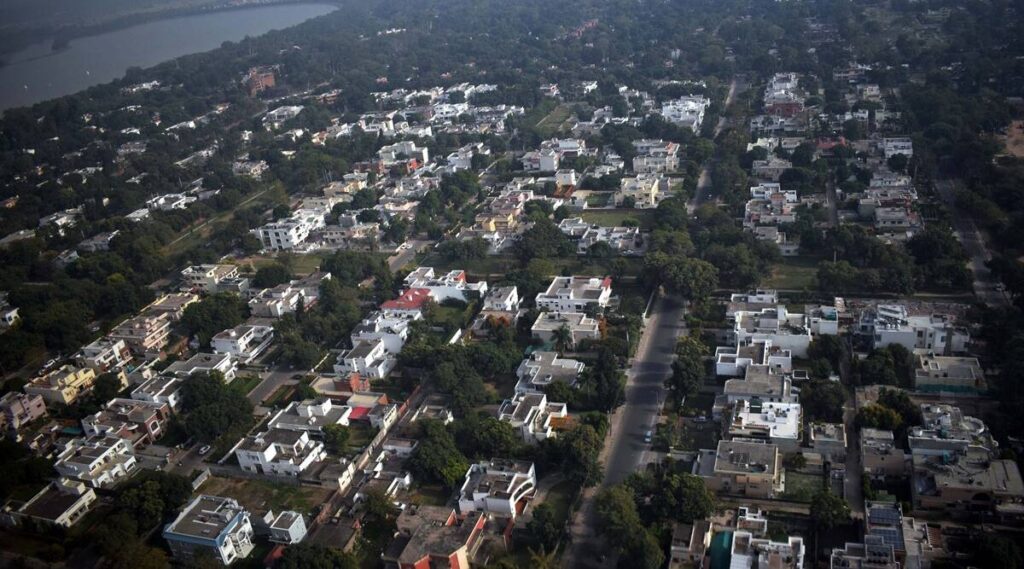
Such ideas of inclusive urbanisms gain significance in the context of a recent decision of the Supreme Court which directed all cities to comprehend environmental and social impacts of infrastructure and urban developments by first undertaking an Environmental Impact Assessment. The bench, while hearing a case against apartmentalisation in Chandigarh – a UNESCO World Heritage site, directed preservation of the heritage of Chandigarh and was constrained to cite Bengaluru as an example of unsustainable urbanisation. The Court observed that it is high time the government took note of adverse environmental impacts of infrastructure development and urbanisation, and not post facto.
A study on two insect families by researchers in major parks of the Tokyo Metropolitan Area emphasised the importance of managing smaller green patches with urban areas as they can influence biodiversity in large parks. Their work highlights how often neglected small green fragments can form a hospitable matrix around larger green spaces extending the wildlife habitat, effectively forming a larger “concealed island in the urban sea”.
Environmental Impacts
A soda ash manufacturing project proposed by Gujarat Heavy Chemical Ltd. (an arm of the Dalmia Group) has been put on hold due to a visibly flawed EIA. The project is proposed to be set up in Mandvi, off the coast of Kachchh, and is likely to cause high levels of air pollution, endanger local ecosystems and pollute the Arabian sea by discharge of effluents.
The land subsidence in Joshimath caused by unplanned and haphazard development in a seismically and ecologically sensitive Himalayan area has resulted in evacuation of dozens of families. It also resulted in the filing of a PIL before the Supreme Court to declare the situation as a natural disaster. The massive infrastructure development in the region, such as Char Dham Project and multiple dams, is considered the cause of this unfolding disaster. And it may well be indicative of the threat latent to several other towns/villages across Uttarakhand, and the rest of the trans Himalayan region.
Ban on Plastic

The NGT has directed Central Pollution Control Board to consider including plastic flowers and leaves as single use plastics so it can be banned. The agency has been given 2 months to evaluate and submit compliance with the NGT. Meanwhile, on 10th January, 2023, the Kerala High Court lifted the ban on non-woven bags of 60GSM and above as arbitrary and illegal. The problematique of such regulation is evident from a 2018 , ESG filed a case before the NGT for enforcement of the Plastic Waste Management Rules, 2016, all documents can be accessed here.
Protection of Lakes: Updates
About 3 years ago, NGT disposed PILs regarding pollution in Agara, Bellandur and Varthur Lakes in Bengaluru in a judgement that included time-bound action plans, protection of lake buffer zones, formation of a monitoring committee. Yet, as the state of these lakes remain as terrible as they were, on 6th January, 2023 the Supreme Court of India has restored the case back to the NGT with a direction that it is finally decided on merits, and with attention to a variety of unaddressed concerns.
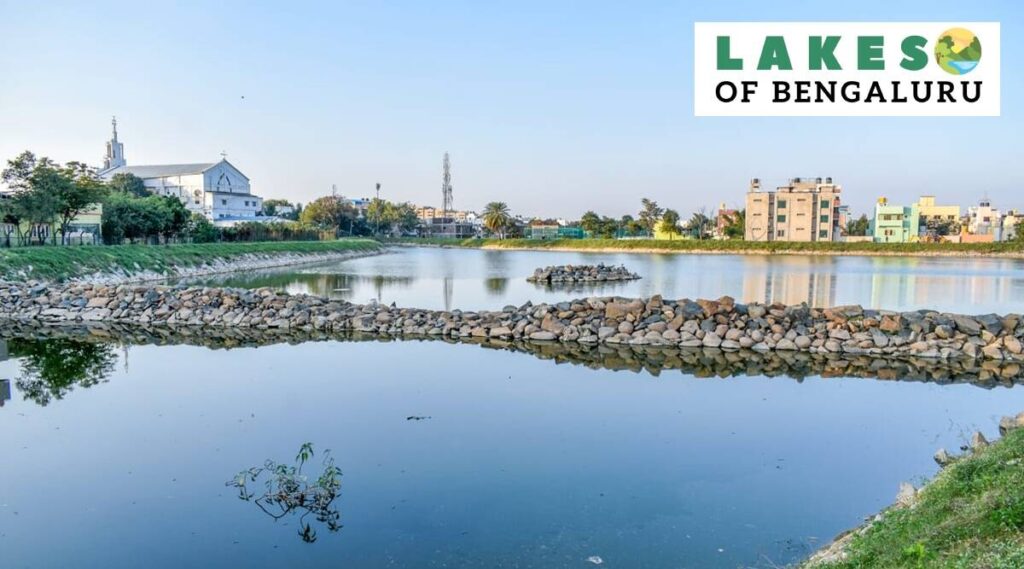
The BBMP claims to have proactively restored the Jinkethimmanahalli Lake in Bengaluru despite resistance from encroachers. The civic agency issued notice to squatters in December 2020 and found 1.6 acres of the 8.26 acres lake was encroached. In July 2021, BBMP evicted the encroachers on the basis of orders from the High Court of Karnataka and claimed to have redeveloped the lake at the cost of Rs 3 crore rupees.
Renewable Energy

A wholly owned subsidiary of Tata announced a project agreement with Vivarea Condominium to construct a solar energy supplying society in Maharashtra with the help of solar panels.The project to be commissioned by October 2023 is said to provide ‘green power’ at approximately 40% less than existing cost of power to Vivarea Condominium.
In a policy move, India may exempt some solar projects from paying customs on imported equipment in order to speed up installation of renewable energy capacity and reduce consumer electricity rates.
Podcast GigaWhat hosted by Mayank Aggarwal for Mongabay contextualised the conflicts emerging with the massive expansion of Renewable Energy Projects. The series concluded in December 2022, in which Bhargavi Rao of ESG explained how very little is being done to address such conflicts. Leo Saldanha had explained in the March 2022 episode how the development of a solar park in Assam attacked indigenous rights and interfered with a elephant corridor.
National Green Hydrogen Mission in India Approved
The National Green Hydrogen Mission was approved by the Union Cabinet on 4th January, 2023. An amount of Rs 19,744 crore has been sanctioned by the government towards the Mission components. The Mission aims at expanding export prospects, decarbonizing energy generation, strengthening domestic industry and to reduce the cost of production from Rs. 350–400 per kilogram to around Rs 100 per kg. India’s first pure green hydrogen plant was commissioned in Assam in April 2022.
Inequality thrives
According to the latest survey of income inequities by Oxfam, “Since the pandemic began in Nov 2022, billionaires in India have seen their wealth surge by 121%, or INR 3608 Crore per day in real terms (Around INR 2.5 crore every minute). The rich have done well for themselves, while the number of hungry Indians has increased from 19 crores to 35 crores.”
Environment Support Group (Trust)
1572, 36th Cross, Ring Road , Banashankari II Stage
Bangalore 560070. INDIA
Tel: 91-80-26713560 | Voice/Fax: 91-80-26713316
Website: esgindia.org Email: socialmedia@esgindia.org
Follow our Facebook, Instagram, Linkedin and Twitter page
- ESG is also registered to secure support under the Corporate Social Responsibility (CSR) scheme of the Ministry of Corporate Affairs. Reg No. -CSR00017320
- Environment Support Group(ESG) is eligible to receive foreign donations/grants per the Foreign Contribution Regulation Act (FCRA)
- All donations to ESG from Indians are eligible for tax exemptions as per Sec. 80G of the Income Tax Act.
More details about ESG’s Financial Reports and Statutory Approvals are accessible here: https://esgindia.org/new/financials-and-statutory-clearances/
Your Monetary Contributions Keep Us Working
Donate Via UPI
(This QR Code is applicable ONLY to Indian/Domestic donors. Providing a PAN is a statutory requirement.
Kindly share the details of donation made to [email protected] after completion of UPI payment.)

